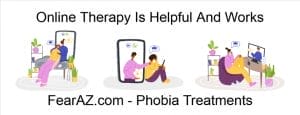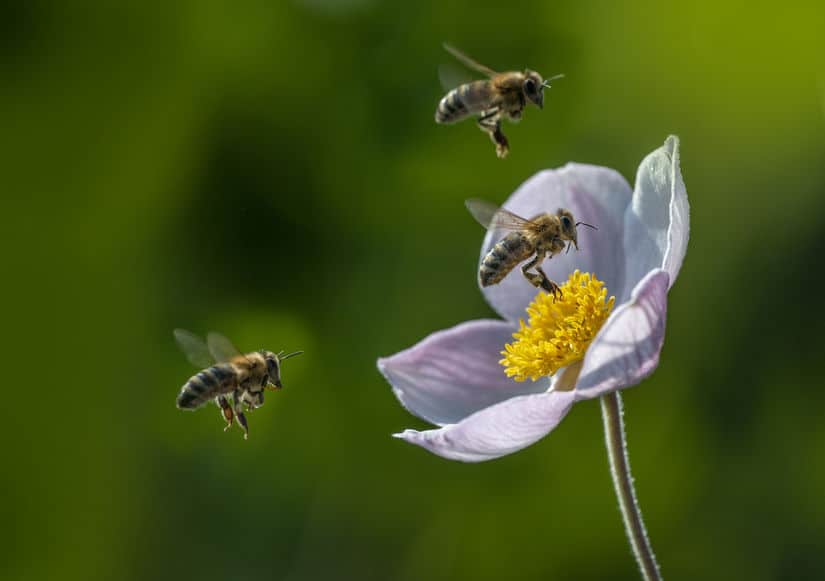Share This Article
Dealing with Apiphobia – Fear of Bees
Picture one of these simple scenarios: a beautiful day on your backyard deck, driving with the car windows open, or perhaps out for a casual summer walk. Then out of the clear blue sky a bee buzzes by or circles you, enticed by your perfume or the sweet drink you have in your hand.
Now, this fun in the sun scenario turns into a terrifying situation. You must put distance between you and this little devil PRONTO.
In most cases a scream and some running around waving your arms will allow you some relief. But what if you’re driving a car, confined to a small room, holding your young niece in your arms, or happen to be in a situation when looking like a fool will not suffice?
This is when apiphobia, the fear of bees, can cause real problems. Working through this fear begins with understanding the root of the problem then taking steps to treat and reduce the phobia or deep fear.
Phobias, just as with famous quotes, have a way of sticking in our minds and not letting us forget them.
“Float like a butterfly, sting like a bee!” Mohammad Ali
If you’re a denizen of classic movies then you know of 1978’s The Swarm. A huge wave of killer bees were coming to a city near you and there was nowhere to hide. Far from reality but entertaining, this movie probably manufactured thousands of unwilling apiphobia sufferers.
A fear of bees and wasps can be awkward to deal with . On the one hand, bees are such tiny creatures compared to us that it can be embarrassing to admit you’re afraid of them. On the other hand, bees sting, and if you have an allergy this can lead to serious reactions. In this case it makes sense to be cautious about bees, or to have a heightened sense of vigilance. However, if an irrational fear of bees leaves you shutting yourself away or screaming wildly, that may be an irrational phobia at work.
So what’s the buzz with the fear of bees and what can you do to conquer it?

What Is Apiphobia?
Giving our fears a name is one of the first steps in labeling and thus tackling them. What is the fear of bees called? You’ll hear it referred to as both apiphobia and melissophobia from the Latin and Greek words for bee, “api” and “mélissa” respectively. For the record, while wasps are closely connected to this phobia and we’ll treat both wasps and bees as a single buzzing source of your phobia here, there’s actually a separate term, spheksophobia, for those with a specific fear of wasps.
A fear of bees is widespread and there is a lot of room to interpret “fear,” from mild to moderate discomfort to a full-blown phobia. That said, there is evidence (albeit nonclinical and online-based) to suggest that apiphobia skews younger and female. According to a 2019 poll based on a purported 69,108 voters on FearOf.com, 89 percent of those responding that they had apiphobia were 34 or younger and 66 percent were women. While this isn’t a scientific study with its rigorous controls—and doesn’t claim to be—it gives a sketch of who is, if nothing else, willing to self-report being afraid of bees.
Causes and Symptoms
It is important to note that a fear of bees is fairly common. If you come too near them and are unlucky, they may sting you. It makes sense to avoid that situation. Some of us get stung when we are too young to know better. For most of us, that first sting is a painful but effective learning experience: the lesson is learned, and that’s the end of it.
For those with apiphobia, however, an early bee sting is only the beginning. Apiphobics may develop a paralyzing fear.
If you’re already afraid of bees, watching the Nicolas Cage remake of The Wicker Man with its infamous “Not the Bees!” scene probably isn’t a good idea (though at 15 percent on Rotten Tomatoes, you’re not missing much). Movies such as these can reinforce learned behavior. If a friend of yours tells you how horrible a bee sting was and you watch films and media where bees cause nothing but pain, that learned behavior may morph into a phobia.
Symptoms of apiphobia may include all of the following:
- Breathlessness
- Rapid heartbeat
- Chest tightness
- Sweating
- Dizziness
- Nausea
- Fixating on scenes in movies or life that feature bee stings
- Panic attacks
- Fainting
- Going out of your way in an extreme fashion to avoid bees or locations where they may be
Children with apiphobia may exhibit the following behavior:
- Crying
- Throwing tantrums
- Clinging to you and refusing to let go
- Freezing up completely
At this point, it’s important to add an important caveat. Phobias are, by definition, irrational fears. If you are allergic to bees, it is completely rational to be afraid of them, lest they cause a serious and potentially life-threatening reaction. As a result, if you fear bees because of an allergy, you do not suffer from apiphobia.
It is also important to note that if you suffer from an allergy to bees, symptoms such as dizziness, chest tightness, and fainting may not be a result of a phobia, but rather a reaction to bee sting. This should be dealt with in the appropriate fashion by getting yourself to a doctor immediately.

Treatment Options
Given how common the condition is, the question of how to get over the fear of bees is one that you can likely tackle yourself without the help of a therapist.
Some steps that you can take to manage your apiphobia include the following:
- Rethink bees: If you imagine bees as buzzing clouds of doom and death just looking to attack humans, you’re bound to be afraid of them. However, you may find bees less terrifying if you rethink them—and you should. Bees aren’t out to get us; on the contrary, we need them to pollinate plants and flowers in order to maintain our ecosystems. In that sense, bees are our friends (and given their declining numbers, they need our help). What’s more, bees’ abdomens typically tear off when they sting us, which kills them and means that stinging you is the last thing they want to do!
- Keep a bee-free home: If you have a colony of bees on your property, contact animal control. They can remove their nest in a humane fashion and take them to a beekeeping sanctuary. You get rid of the bees, and they can continue to go about their lives and make honey for us, which is a sweet deal as bees are essential.
- Don’t attract bees: If you don’t want to come into contact with bees, try to avoid wearing strong scents (cologne or perfume) that may attract them. They are also attracted to bright colors (think flower petals and nectar) so wearing darker colors in bee-heavy areas may help.
- Consider support groups: Teamwork works for bees, and it can work for you too. Again, apiphobia is common, so there are plenty of people out there who are likely to understand how you feel. Joining a support group can help you feel as though you’re not alone in being afraid of bees and help you make a few friends along the way.
For children with apiphobia, take the following steps:
- Listen to them: The worst thing that you can do with most childhood phobias is to chastise the child and make them think they can’t talk to you about their fears. Children are young and are still learning how to experience the world. Shutting them down in this way likely won’t rid them of the phobia and may well cause it to fester deep within them, making it worse. Let them air out their fears, empathize with them, and answer their questions whenever possible. Remember that above all, your child wants guidance and reassurance.
- Lead by example: Showing that you aren’t afraid of bees can help them. Don’t teach your children to be daredevils courting danger of course, but simply swatting bees away and avoiding screaming and extreme behavior can teach your child the proper way to react.
- Give praise: After they react in a calm way towards bees, praise them to reinforce their behavior.
- If they are allergic to bees, make sure there is always an EpiPen on hand.
Finally, if after all of these methods your apiphobia still persists or is extreme and crippling, you may want to consider speaking with a therapist.
By following these steps, you can say “buzz off” to your fear of bees.



